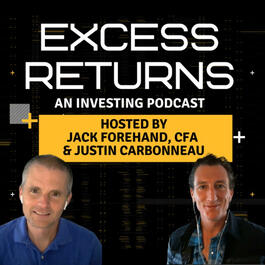
Cole Smead on Deficits, Inflation, and the Erosion of Earnings Quality in Technology Stocks
In this episode of Excess Returns, we welcome back Cole Smead of Smead Capital for a wide-ranging conversation on markets, history, and the principles of value investing. Cole shares his perspectives on fiscal largesse, inflation, passive flows, energy markets, U.S. exceptionalism, and the timeless lessons of Buffett and Munger. His insights bridge economic history with today’s market realities, giving investors a framework to think about risk, capital allocation, and opportunity costs. Deficits, monetary policy, and why recessions are hard to find today Inflation dynamics and lessons from the 1960s and 1970s The U.S. government’s role in markets (Intel stake, big government policies) American exceptionalism vs. global capital allocation improvements Earnings quality and the divergence between accounting and economic profits Passive investing flows, weak competition, and investor behavior Energy investing: from fracking bust to efficiency and capital discipline Comparing the AI boom with past manias and capital cycles Smead Capital’s investment process and evaluating “wonderful companies” Buffett, Munger, and the lessons of asset-light vs. capital-intensive businesses Closing insights: why returns on capital matter more than EPS or revenue 00:00 – Opening quote and fiscal deficits 02:00 – Debt, inflation, and recession risks 08:50 – Government stake in Intel & big government era 12:15 – U.S. exceptionalism and arrogance 17:30 – Earnings quality erosion in U.S. businesses 24:00 – Passive flows and human behavior 27:30 – Opportunities in energy investing 34:00 – Energy buildout vs. AI boom 38:00 – Smead Capital’s investment process 44:00 – Lessons from Buffett and Munger 51:00 – Standard closing question
From "Excess Returns"


Comments
Add comment Feedback